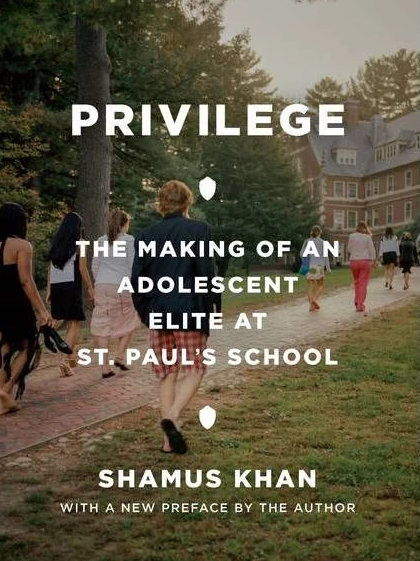A friend of mine called me just before the holidays, confirmed my home address, and said that he was sending me a book that he wanted me to read. George and I served together on the Board of Trustees of our alma mater, McDonogh School, and he wanted to hear my thoughts about the book.
Privilege was written by a sociology professor, Shamus Rahman Khan, an alumnus of St. Paul’s School in New Hampshire. Dr. Khan received permission to research the book during a year in which he returned to the school as a teacher while taking a sabbatical from his position at Columbia University.
Since Privilege was published more than a decade ago, Professor Khan has moved on to Princeton University. Rather than write a formal review of a book that is no longer new, I thought I would pen a few thoughts about his observations and findings.
The Reality of College is that It is a Place Dominated by the Rich
In the Introduction titled Democratic Inequality, Dr. Khan asks a question: “How is it that some of our most elite and august institutions – those that are central pathways to reaching the highest levels of economic success – have transformed into being more open to those they previously excluded, yet the overall levels of inequality in our nation have increased so dramatically?” The openness is racial, he writes. However, when class is added to the mix, the “reality of college is that it is a place dominated by the rich.”
Professor Khan writes that colleges are blind to the struggles of the poor. Despite the documented disadvantage of being poor, colleges treat them the same as they treat the rich ones. “Lots of rich kids go to college. Few poor ones do.”
In his research on inequality, Dr. Khan writes that he keeps coming back to education “and elite education in particular” writing that “one of the best predictors of your earnings is your level of education; attending an elite educational institution increases your wages even further.”
Elite Private Schools Create a Meritocracy of Talent
Over the past six decades, according to Dr. Khan, elite schools have attempted to shift from being “bastions of entitled rich boys” toward being schools where talented members of all of society belong. Many of these schools accepted African American students before the public schools integrated and many became fully integrated coeducational institutions where girls could thrive.
Shifting from a focus on admitting rich boys led many of these schools to create a meritocracy of talent. Professor Khan writes that “at its core, meritocracy is a form of social engineering, aimed at identifying the talents of members of society so that individuals can be selected for appropriate opportunities.” By focusing on merit, the former admissions criteria of social ties and status were eliminated and replaced by personal attributes such as hard work, discipline, and native intelligence, qualities that can be evaluated separately from the condition of social life.
Dr. Khan claims that examining the rise of meritocracy provides a better understanding of the new elite and today’s inequality. According to him, the new elite believe that anyone can achieve what they have achieved, and that upward mobility is a permanent possibility in the United States of America.
Instead of feeling entitled, Dr. Khan writes that the new elites attending St. Paul’s (and presumably other schools like it) “develop privilege, a sense of self and a mode of interaction that advantage them.” Three lessons of privilege that students at St. Paul’s learn are:
- Hierarchies are natural and can be treated like ladders, not ceilings.
- Experiences matter.
- Privilege means being at ease, no matter what the context.
Professor Khan dedicates a chapter titled The New Elite to a history of the acquisition of wealth in America, the creation of boarding schools for wealthy children, and the change in the percentage of wealthy people whose wealth came from accrued capital to today’s situation where more than 50 percent of our nation’s wealthy earn their wealth through salaries and bonuses.
Dr. Khan concludes that chapter by writing that two-thirds of St. Paul’s families can afford to send their children to a school that costs more than $40,000 per year in tuition, room and board (note: this is a 2010 figure, the St. Paul’s School website states that tuition remains frozen at $62,000 for the 2021-22 school year). More than one third of St. Paul’s graduates attend Ivy League colleges and universities and the rest attend other prestigious colleges. While the new elite may not be based on social ties and inherited wealth, a large percentage are wealthy.
The St. Paul’s Experience
Finding One’s Place is the title of a chapter that describes the St. Paul’s experience. It also builds a case for Dr. Khan’s premise that one of the lessons of privilege learned at St. Paul’s is the concept of hierarchies, and that one can rise in a hierarchical environment like climbing a ladder. St. Paul’s has a culture that enforces certain traditions based on the years that you have attended the school. Seniors are entitled to more privileges than ninth, tenth, and eleventh grade students.
Through a series of examples, Professor Khan notes the importance of the teacher-student relationship at St. Paul’s and writes that it’s not a relationship, it’s a set of relationships. Faculty members don’t teach in a radically different way than public school teachers but because they live on campus with their students, they also serve as advisors, coaches, mentors, and friends.
Students find their place by experiencing the relationships developed at the school between their peers and their teachers. Successfully learning to negotiate relationships enables the hierarchy to disappear for those students who figure them out.
Most students ascribe their selection into the school as something that they earned through their hard work, not their parents’ wealth. At the same time, Dr. Khan writes that non-white and non-wealthy students “have a sense of reverence for the institution that affords them previously unimaginable opportunities.” These students didn’t have other choices. “They had to leave home to acquire the education that most students at St. Paul’s take for granted.”
Throughout the next three chapters (titled The Ease of Privilege, The Performance of Privilege, and Learning Beowulf and Jaws), Professor Khan provides the reader with examples of student life, student situations, the life experiences of students and how students develop the habits that help them navigate the life of the privileged. “Success at St. Paul’s requires learning the school’s lessons, and these demand that students remake themselves. Most are happy to do so.”
How Elites Adapted to the Changes of the 21st Century
In his conclusion chapter, Dr. Khan points out that the lives of 500 students at St. Paul’s are not likely to shed much light on the American experience. He believes that his recent experience at St. Paul’s has revealed how elites have adapted to the changes of the 21st century. Three themes are identified.
The collectivist movements of the 1960’s died. The groups of blacks, women, gays, and immigrants who argued for change also argued that the characteristics that grouped them should no longer matter. The elites adopted this stance. They are more diverse and have accepted the American story of “work hard, get ahead.” Inequality continues to be present, but Dr. Khan points out that “elites now view it as fair.” One of the key features of American exceptionalism is individualism, me over we. When individualism “is combined with meritocracy it allows for the justification of inequalities that should be an embarrassment to our nation.”
Dr. Khan writes that the “new” inequality is the democratization of inequality. Class, exclusion, and inheritance have been rejected. Democracy has embraced the notion of individuals having their own fair shake. The trick of privilege has been to make the hierarchy between the new elite and others to seem natural versus systemic.
Even though the elite have opened themselves to the world, Dr. Khan writes that the world has not opened to all. “Access is not the same as integration.” Those who are not successful are viewed as those who have failed to seize the opportunities provided through the new, open society.
Dr. Khan writes that “democratic inequality comes with a democratic conundrum… By becoming more democratic, the elite have undercut the power of the weak within our nation.” Furthermore, he writes that the elite story about the triumph of the individual is a myth. “Women still make less than men, blacks make less than whites, and students from St. Paul’s get into better colleges than equivalent ones who attend non-elite schools.”
Diversity among the elite does not mean mobility between the rich and the poor. The world is more unequal even though the American elite are more diverse. Professor Khan’s final point is that “the production of privilege will continue to reproduce inequality while implying that ours is a just world; the weapons of the weak are removed, and the blame for inequality is placed on the shoulders of those whom our democratic promise has failed.”
Final Thoughts
I found Privilege to be a fascinating book. Shamus Khan excellently uses his ethnographic interviews of St. Paul’s students, faculty, administrators, and parents to outline his case that American individualism combined with meritocracy has cast aside the power of collectivism and increased the power of the elite. The 150-year-old school with its 500-student campus is small enough for the narratives to hold weight in the thoughtful examination of a reader new to the topic.
As a private school graduate, albeit one from the non-wealthy side who attended private school thanks to a scholarship, I concur with Dr. Khan’s observation that non-wealthy students have a reverence for the institution that gave them so many opportunities. The fact that most students at private schools come from wealthier families is not a surprise, nor is it a surprise that the higher tuition at elite private schools like St. Paul’s means that their families are among the nation’s wealthiest.
I have a strong feeling that the parent or grandparent of a full-pay private school student will freely admit that they are spending the money to give their child or grandchild an opportunity to receive a better education than they could receive at the local public school. I doubt that they have thought much about how their choice of sending a child to a private school contributes to the democratic inequality in America.
If you want a thought-provoking book, I recommend reading Privilege. There are no easy answers to solving the inequality issue although ensuring that everyone in America receives a quality education would be a good start.











